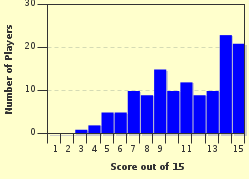Quiz Answer Key and Fun Facts
1. I say "Ode to Joy - Choral Symphony", you say ...
2. I say "[4'33"]", you say ...
3. I say "Pulcinella", you say ...
4. I say "Symphony of a Thousand", you say ...
5. I say "Carmina Burana", you say ...
6. I say "Pierrot Lunaire", you say ...
7. I say "Songs Without Words", you say ...
8. I say "Messiah", you say ...
9. I say "Carmen", you say ...
10. I say "La Traviata", you say ...
11. I say "Surprise Symphony", you say ...
12. I say "Can She Excuse My Wrongs", you say...
13. I say "Rhapsody in Blue", you say...
14. I say "Children's Corner", you say...
15. I say "Eine kleine Nachtmusik", you say...
Source: Author
antwell
This quiz was reviewed by FunTrivia editor
ertrum before going online.
Any errors found in FunTrivia content are routinely corrected through our feedback system.


